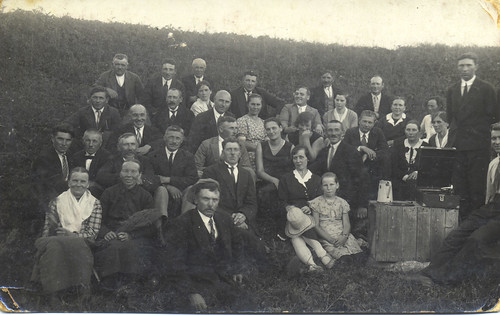1929: Rauza
About two weeks later I was notified through the district town hall telephone (there were still no telephones in the country ) that I had a managerial job at Rauza, near Smilene, 15 kilometres towards Polsmane. I went straight away; first to Prauliena to get my things: bedding, work clothes, etc. I arrived at Prauliena in the evening, collected my things and went straight to Madona station. I was very angry with Marija and did not even say good-bye. Rauza was near a main highway in Vidzeme, about 2 kilometres. There to receive me was a committee member, Lacitis, who lived next to the factory. The factory was in the Rauza manor, opposite there was the district town hall, one shop, a blacksmith, and the district hall. It was a small centre. It took only one day to get to Riga. In the morning at 5 AM, a bus on the highway got you to Riga at 8 to 8:30 and in the evening it left Riga at 4 PM.
The factory was quite small and was in the process of being changed from manual to steam. The steam generator was already there, but the milk was heated over water which was heated by steam, the same went for the cream in special cans. There were no collection points – all the milk used was brought in by the farmers directly. There were only two of us working; the general worker and the cleaner, a 19 or 20 year old youth, Janis Mietins, very obedient and hard-working, but not too intelligent.
In the new job, the first decision I made was to not get involved with women.
At Rauze there was a youth club, mainly concerned with sport and gymnasium exercises. All the young people from the district belonged to it, they even had a uniform; the girls wore a black velvet hat, black slacks, a grey blouse with black velvet collar and cuffs, a black tie and the section number on the left sleeve. The previous factory manager had been elderly, about 50-years-old; he had been a good bookkeeper but was not interested in women – a typical bachelor. I was 22, and the girls in the area had been wondering whether I knew how to kiss. To deliver the milk the farmer’s daughters were doing it themselves, dressed as if for a party. Even in the evenings they were finding excuses to visit the factory, and of course I had to escort them home, and so started a romance with many girls at once.
Saturday nights we gathered at the factory. The district secretary’s assistant, 25-year-old Oskars Rusis was the only son of a farmer and good-looking. Also there was a neighbour farmer Lacitis. Our topic of conversation was women, especially after we had ordered a couple bottles of beer from the local shop. Because all three of us were in the reserve army we had revolvers. When the beer bottles were empty we shot the bottles. We lay the bottles down on the table and it had to be hit with one shot, if you missed you had to buy half a dozen beers.
I had bought a record player, one with a spring, which at that time was very new. We started behaving in a silly way to get people talking. We were competing to think of something new, such as removing a bridge near a house. I thought we were getting carried away. Suddenly, I got an offer of a managerial job closer to home at Snepele where the manager was being sacked and I was asked to apply for the job by a member of the committee who was married to my cousin named Kadikis from Strautmali at Snepele. I did not think about it much and gave notice at Rauze and gave a big farewell party for which I had brewed a really strong beer so that even all the oldies drank and were happy.


